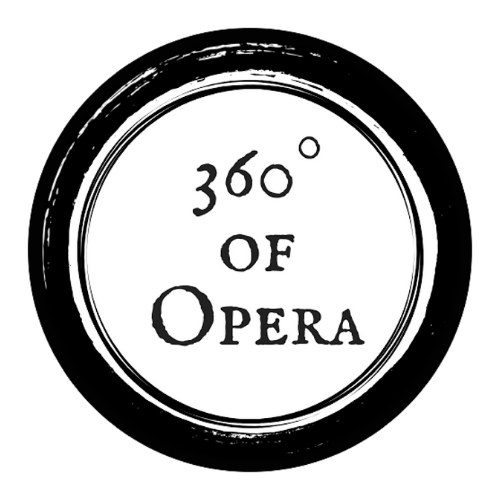Cantata: Verismo Meets Vogue at Red Eye NY
Welcome to Hell’s Kitchen, where a crimson-hued haven known as Red Eye NY beckons to passers-by. Tonight, it’s not just another cabaret or drag show: Cantata, a “Queer Classical Music Kiki of epic proportions,” is redefining the boundaries of opera and drag culture.
The crowd feels like a beautiful microcosm of the diverse LGBTQIA+ community: To drink, or not to drink. Full makeup, or tank top. Partaker of a fiesta, or onlooker of an extravaganza. The lines are blurred, but the choice remains yours. English translations are projected on a screen behind the performers, a thoughtful touch that makes the performance accessible to many more.
At the heart of this residency is Jordan Weatherston Pitts, a classically trained tenor who produces, emcees, and performs in Cantata under his drag persona, Creatine Price. “I built the whole series from the ground up,” Pitts explains. “My dream would be to bring it to a space like Lincoln Center Theater or the Folies Bergère in Paris—somewhere with a huge tech element and where I have the costume budget to really take people through opera history.”
I walk in on Donatella Fermata (Michael Galvin) peeling off her luxurious faux fur coat in stiletto boots that would make Louboutin envious. Her lip-syncing is a masterclass in drag artistry, but it’s when she reveals a fluorescent green T-shirt emblazoned with “Mimì” that the audience truly comes alive. Later, she returns to the stage with a disco “Habanera,” instantly transforming the jam-packed venue into a dance hall. Singers tend to add much sensuality to their interpretation of the defiant, somewhat reckless Carmen—after all, she’s playing a game of hearts, where women historically fall under the male gaze. But Fermata, waving her dramatic water sleeves, is no red rose daring you to pluck her. Her performance feels like a commentary on opera itself, reimagining beloved characters through a contemporary queer lens.
Krystofer Maison takes the stage next, tackling Handel’s “Cara sposa” from Rinaldo, a song typically sung by countertenors and mezzos. The singer-songwriter and producer seamlessly switches between a velvety head voice and a powerful belt, employing everything in his toolbox to optimize the emotive expression. They are later joined by Price for Maison’s “Let the Credits Roll,” an original number that oozes “main character energy,” with such self-assured lyrics as “Try to change the channel / I’m in every frame and panel,” which calls back to his experience as a TV/film producer. Among the bedecked queens in their glamorous gowns, Maison’s duster jacket, platinum blond wig, corset, and glitter boots stood out with a statement of their own.
Balena Canto (Matthew Maisano) opts for a more stand-and-sing approach, letting their rich voice and soulful singing speak for themselves. Perhaps, as we step outside, we shall reflect on all the little rules we impose on traditional casting for opera. But it is not every day that we witness an absolute vision in a vibrant maxi dress singing “Mein Sehnen, mein Wähnen,” so in that moment, we can do nothing but indulge in the reverie. As one of the two encore songs, she steps out (and sits down) to sing “Send in the Clowns”—we are blessed with crisp, expressive English diction. As something of a maximalist, I’m always grateful when a singer reminds me that less (theatrics) can really be more, when you have a clear voice and sing from the heart.
But Cantata doesn’t just showcase the talents of singers—it celebrates instrumentalists as well. Tilda Watersclear, resplendent in a red baby-doll dress, reimagines “Che gelida manina” on trombone. The metallic tenor aria takes on a sweet, melancholy tone that tugs at the heartstrings. Watersclear would later join Price for “The Trombone Shall Sound,” a clever adaptation of “The Trumpet Shall Sound” from Handel’s Messiah. At the time of writing, a video of this performance has garnered 84.2K views on TikTok, proving that opera is far from dead—it’s evolving and finding new audiences in unexpected places.
Behind the piano sits Felix Jarrar, a composer, coach, pianist, and the Assistant Conductor at Florida Grand Opera for the 2024-2025 Season. “This program marries verismo—one of my specialties—with drag, which I’ve featured in compositions such as the operas Mother Goose and Pompadour Porcelain,” Jarrar notes. His rendition of the intermezzo from Cavalleria Rusticana is so captivating that one can’t help but imagine him conducting the full work in the future.
Cantata is by no means the first show that fuses opera and drag, but it’s setting new standards for the caliber of performances. Verismo, known for its emotional intensity and vocal demands, is no easy feat. To perform it in full drag is nothing short of extraordinary, especially for masculine voices taking on women’s roles. Yet these queens make it look effortless, their passion for their craft evident in every note and gesture. It can be seen as part of a movement democratizing an art form often seen as elitist, and proving that opera can be accessible, relevant, and downright fabulous. These performers are challenging norms, and sharing their authentic selves with the world. They remind us that behind every perfectly applied lash and booming note is a person with dreams, resilience, and a story to tell.
As Donatella Fermata and Creatine Price prepare for their upcoming one-woman shows (both are 2024 Live Arts Boston Grantees), mark your calendars for October 19, when Cantata makes its monthly comeback. Whether you’re a seasoned opera buff or a curious newcomer, there’s a place for you in this vibrant, evolving art form. So come as you are, leave your preconceptions at the door, and prepare to be amazed. After all, in the world of Cantata, the only rule is that there are no rules—except, perhaps, to expect the unexpected.
-written by Chloe Yutong Yang.



